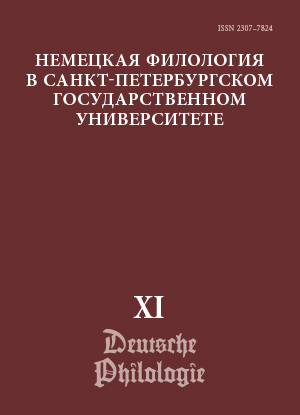Structures with caritive semantics in specialized texts of the 17th and 18th centuries (on the material of S. Gubert’s “Stratagema oeconomicum“ and M. V. Lomonosov’s “Economy of Livonia”)
Abstract
In the German language, caritive semantics (i. e., semantics with the meaning of deprivation or absence of any feature) is commonly expressed by constructions with the preposition ohne. In the Russian language, caritive semantics is usually expressed by structures with the preposition bez or derivatives with the prefix bez-/bes-. The article studies two specialized texts on housekeeping: German “Stratagema oeconomicum“ (3rd ed. — 1688) by S. Gubert and its Russian translation — “Economy of Livonia” (1747) by M. V. Lomonosov. The aim of the study is to identify and describe the semantic and typological features of constructions with caritive meaning based on a comparative analysis of German and Russian specialized texts of the 17th and 18th centuries. In the course of the study, it was found that the German constructions with the preposition ohne are most often translated into Russian by structures with the preposition bez as the most common way of conveying caritive meaning in Russian. Another way is using constructions with the preposition krome and constructions with a negative particle ne. Words with a prefix bez-/bes- are used in the Russian text only for the indirect transfer of the caritive meaning.
Keywords:
cultural linguistics, comparative analysis, specialized text, caritative, German, Russian, 18th century
Downloads
References
Литература
References
Downloads
Published
How to Cite
Issue
Section
License
Условия передачи авторских прав на статьи и рецензии, опубликованные в ежегодном периодическом издании «Немецкая филология» регулируются условиями Лицензионного Договора автора с Санкт-Петербургским государственным университетом. В соответствии с Лицензионным Договором опубликованные материалы находятся в открытом доступе, а авторам бесплатно предоставляется неограниченные возможности их распространения и самостоятельного архивирования.




